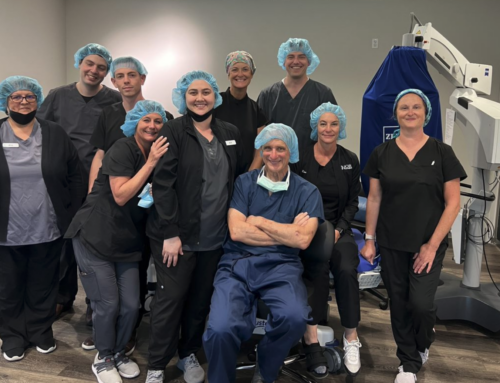
Many people have glaucoma but don’t know it.
Glaucoma slowly damages the eye’s optic nerve, the important link between the eye and the brain. People with glaucoma usually lose vision before they notice any problems with their eyes.
The most common type of glaucoma is called primary open-angle glaucoma. This is when fluid in the eye does not drain properly. Pressure inside the eye goes up and damages the optic nerve. This form of glaucoma usually steals your side vision (peripheral vision) first, so you probably won’t notice changes in your vision right away. Over time, though, you’ll lose central vision and have trouble seeing things.
Unfortunately, once you lose your vision from glaucoma you can’t it back. And ophthalmologists don’t yet know how to stop glaucoma from developing in the first place. However, there are ways to prevent serious vision loss and blindness from glaucoma.
Here are 10 ways to prevent glaucoma.
1. Regular eye exams play a big role in saving sight!
If you are at risk for glaucoma, you should see your ophthalmologist regularly for eye exams. They can find the disease in its early stages, then watch and treat it. It’s equally important to take your glaucoma medications exactly as your doctor says to.
2. Taking steroid medication? Talk with your eye doctor.
Taking steroids for long periods of time or in high doses can raise your eye pressure, especially if you have glaucoma. Steroids that you take by mouth or use around your eyes are the most likely to raise eye pressure. Always tell your eye doctor if you are taking any kind of steroids.
3. Eat well to see well.
Eat plenty of leafy green vegetables and colored fruits, berries and vegetables every day. They contain vitamins and minerals that protect your body and eyes. In fact, studies show that eye-healthy foods are better than vitamins at preventing glaucoma.
4. Exercise . . . but carefully.
Intense exercise that raises your heart rate can also raise your eye pressure. But brisk walking and regular exercise at a moderate pace can lower eye pressure and improve your overall health. If you lift heavy weights, have a qualified trainer show you how to breathe properly during this exercise.
5. Protect your eyes from injury.
Eye injuries can lead to glaucoma. Always wear protective eyewear during sports or while working on your home and in your yard.
6. Avoid head-down positions.
If you have glaucoma or you’re at high risk of the disease, don’t place your head below your heart for long periods of time. That includes staying away from inversion tables or gravity boots for back pain. Head-down positions can greatly raise your eye pressure. Some people with severe glaucoma may need to avoid certain yoga positions. Ask your doctor if you need to avoid a head-down position in your exercise routine.
7. Sleep in the right position.
If you have glaucoma, avoid sleeping with your eye against the pillow or on your arm. People who have obstructive sleep apnea (OSA) are at risk of glaucoma, or may have more serious disease. If you snore heavily or stop breathing throughout the night, get tested for OSA.
8. Protect your eyes from sunlight.
There is some evidence that the sun’s UV rays may cause a type of glaucoma. Wear quality polarized sunglasses and a hat when exploring the outdoors.
9. Keep your mouth clean.
Recent research links gum disease with optic nerve damage in glaucoma. Brush and floss your teeth every day and see your dentist regularly.
10. Tell your ophthalmologist about your blood pressure medicine.
If your blood pressure drops too low during sleep, it can worsen glaucoma damage. If you take blood pressure medicine at night, or if you have low blood pressure symptoms (like feeling woozy), tell your ophthalmologist. They can discuss this with your primary care doctor. Do not change your blood pressure medication on your own.
Treatment:
- Eye Drops: Eye drops are the most common treatment for glaucoma. They work by reducing the intraocular pressure, which helps to prevent damage to the optic nerve. It is essential to use eye drops as directed and to follow up with your doctor regularly to ensure the treatment is working correctly.
- Oral medications: Eye drops alone may not bring your eye pressure down to the desired level. In that case your eye doctor may also prescribe oral medicine.
- Laser Treatment: Laser treatment can be used to treat glaucoma by reducing the amount of fluid produced in the eye, which helps to lower intraocular pressure. This treatment can be performed in the doctor’s office and is typically quick and painless.
- Surgery: In severe cases of glaucoma, surgery may be necessary to reduce the intraocular pressure. The most common surgical procedure for glaucoma is called trabeculectomy, which involves creating a small hole in the eye to allow fluid to drain out, reducing pressure.
Glaucoma is a serious eye disease that requires early detection and treatment to prevent vision loss. Taking preventative measures, such as regular eye exams, maintaining a healthy lifestyle, protecting your eyes, and managing medical conditions, can reduce the risk of developing glaucoma. If diagnosed with glaucoma, treatment options such as eye drops, laser treatment, and surgery can help manage the condition and prevent vision loss. It is essential to work closely with your doctor to determine the best treatment plan for your individual needs.
Our Focus is on You!
When you come to us as a patient at Barth Vision and Optical, we will begin your treatment with a comprehensive eye exam that will employ the most advanced, state-of-the-art diagnostic equipment available in the vision care world today. Read more…


